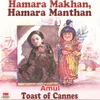The 1976 film Manthan, based on the origin of the Gujarat Co-operative Milk Marketing Federation (GCMMF-Amul Dairy), was recently in the news (Business Standard, June 7, 2024). Its wonderfully restored version received rave reviews at Cannes and had a select run in Indian movie halls. Social media buzzed about the quality of the restoration and the movie’s enduring magic.
This renewed interest in Manthan made me reflect on how prophetic Verghese Kurien and the Amul team were to commission a full-fledged movie on their origin. Yes, the movie did not use the names of real people, but there was no doubt that it was about how Amul came to be.
There aren't very many movies that capture a company’s origin or a founder’s struggles. In Hollywood, recent examples include The Founder (Ray Kroc/McDonald’s), The Social Network (Mark Zuckerberg/Facebook), and The Aviator (Howard Hughes/TWA). In India, there’s Guru (rumoured to be a biopic of Dhirubhai Ambani), Soorarai Pottru (Captain Gopinath/Air Deccan), Vijayanand (Vijayanand Road Lines), and the documentary Pralhad (Finolex). The last two were produced by the companies themselves, while the others were by mainstream production companies, with or without permission.
There are scores of movies built around semi-fictional business stories; even HBO’s acclaimed series Succession is loosely based on a media tycoon’s life.
Why is this relevant for us marketers, and what lessons can we learn from an effort such as Manthan?
Content marketing has gained traction among marketers over the last decade. Companies have been told they need to move beyond creating single ads or campaigns, and running them for extended periods. Consumers' attention spans are narrowing; their field of vision is changing all the time with a variety of media clamouring for their attention. The customer’s decision journey is becoming more complex, requiring brands to create a constant stream of content to engage with their audience.
Companies like GE have even mandated that they need to have a Content Factory (in addition to factories that manufacture products). But what do these content factories make? And why will a consumer want to see a 30-minute film on turbines or engines?
Well, while not everyone may be interested in spending time on the latest engine technology, if you are a mechanical engineering student, or a prospective customer of GE engines, or a researcher working on engine technology, you might find value in such content. What’s more, it could impress top students to apply for jobs at GE, sway engine buyers in GE’s favour, or encourage researchers to collaborate with the company on a new idea or to even share a patentable idea with it.
Content factories produce more than just films; they may produce white papers, books (like those by RM Lala, Harish Bhat, S Ramadorai, N Chandrasekaran, and R Gopalakrishnan from Tata), podcasts (such as the Harsha Bhogle-narrated Paradigm Shift about AI by Microsoft), infographics, topicals (again, Amul sets the bar high here), influencer content, events, and games, etc. The key is to ensure the content aligns with the corporation's purpose and brand. Overzealous brand managers engage multiple social marketing agencies to participate in every little ‘moment marketing opportunity’, leading to negative blow-back. That, in my book, is content marketing gone wrong.
Finally, there is the big bold idea like Manthan. What was the secret of its success and how do we measure its impact? For one, it was good cinema, not just a hagiographic account. Kurien assembled a great team: Shyam Benegal, Vijay Tendulkar, Kaifi Azmi, Govind Nihalani, Naseeruddin Shah, Smita Patil, Girish Karnad, to name a few. The film was critically acclaimed and went on to win several national awards. It probably recouped its investment and paid off richly to Amul in the goodwill it generated.
Snippets of the film have been used by Amul/GCMMF in numerous corporate ads that also often feature the lilting song, ‘Mero Gaam Katha Parey’ by Preeti Sagar (music director Vanraj Bhatia). Manthan worked because it was a bold movie that did more than tell a corporate story; it was good filmmaking.
I have to admit that I have tried, in vain, to get brands to support a full-fledged feature film venture, but never got beyond a simple product placement. Manthan remains the polestar in my book.
Regarding films about founders, this column will be incomplete without the mention of arguably the best feature film ever made: Citizen Kane. Loosely based on the life of newspaper mogul William Randolph Hearst, it continues to inspire content creators with its groundbreaking filmmaking and narration.
Ambi Parameswaran is an independent brand strategist, best-selling author and founder Brand-Building.com. He can be reached at
ambimgp@brand-building.com Unlock 30+ premium stories daily hand-picked by our editors, across devices on browser and app.
Pick your 5 favourite companies, get a daily email with all news updates on them.
Full access to our intuitive epaper - clip, save, share articles from any device; newspaper archives from 2006.
Preferential invites to Business Standard events.
Curated newsletters on markets, personal finance, policy & politics, start-ups, technology, and more.
)